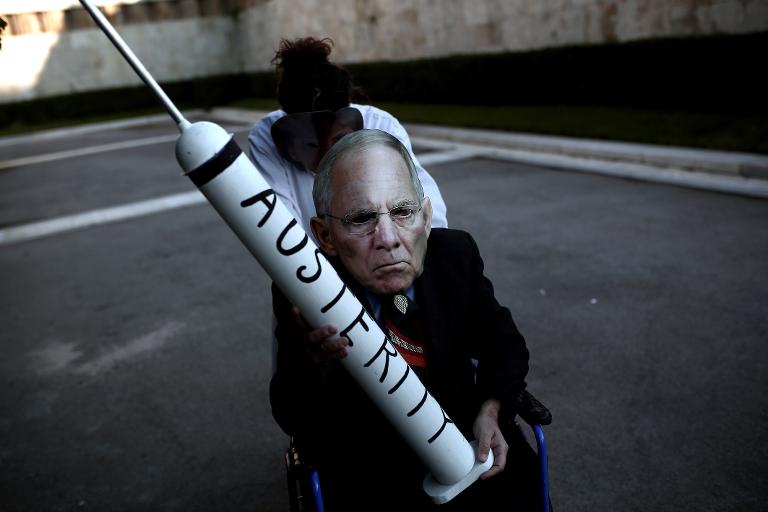
Greece battles eurozone in bailout showdown
The hard-left government of Prime Minister Alexis Tsipras is trying to win a radical overhaul to the terms of its 240 billion euro ($270 billion) bailout which it says has damaged the Greek economy after years of imposed austerity.
But Greece's 18 eurozone partners, led by the influential German Finance Minister Wolfgang Schaeuble, set an uncompromising tone for a meeting that promised to be an extremely tense affair.
"I feel sorry for the Greeks at the moment. They've elected a government which is currently acting irresponsibly," Schaeuble told German public radio.
"My guess is that it's all a big game of poker for this new government," he said, adding that it was up to Greece to decide whether it wanted to remain in the eurozone.
Tsipras swept into power after elections last month on a promise to tear up Greece's current bailout agreement, all the while keeping the country in the 19-member eurozone.
To meet that pledge, Tsipras is asking his eurozone partners to ditch the current deal and to agree to six months of short-term funding to buy the time to hammer out a new agreement, this time without austerity conditions.
- 'Wide apart' -
But Greece's EU partners are infuriated that Athens is trying to end its huge bailout, and demand that it instead agree to extend the current programme unchanged by at least a few months and then talk about what happens afterwards.
"What I favour today is the extension of the current programme," French Finance Minister Michel Sapin said as he arrived for talks which look set to last late into the night.
"The positions are fundamentally wide apart, let's see what can narrow the gap," said Belgian Finance Minister Johan Van Overtveldt.
Athens categorically refuses any extension of the detested current programme, arguing that it has destroyed the economy and thrust millions of Greeks into poverty.
Greece is represented by new finance minister Yanis Varoufakis, a hard-charging professor and blogger, who wrote in an opinion piece before the talks that the Mediterranean nation was against "playing games".
"We are determined to clash with mighty vested interests in order to reboot Greece and gain our partners' trust," Varoufakis wrote in The New York Times.
"We are also determined not to be treated as a debt colony that should suffer what it must," he said.
EU Economic Affairs Commissioner Pierre Moscovici said he believed a deal was within reach despite the acrimony.
"This is a discussion that I know will be complicated but I am certain that we can agree. The will to agree is there," Moscovici said.
At the height of the debt crisis in 2011-12 the possibility that Greece would crash out of the euro panicked world markets, afraid that Athens' plight would doom the currency bloc and destabilise the global economy.
Analysts say this is much less likely now because of changes made to strengthen the eurozone's defences, but markets are still watching Monday's talks closely.
The Greek stock exchange dropped by more than 4.0 percent but European markets were little changed overall, waiting to see what emerges in Brussels.
- 'Decision of principle' -
The challenge Monday will be to find wording that satisfies all sides after a Eurogroup finance ministers meeting on Wednesday ended in chaos without even an agreed statement.
"I think today we need a decision of general principle on whether Greece wants to extend the current programme or a completely new programme -- or if they want to head on without any programme, though I think that is the least probable," a European source told AFP.
The bailout standoff is the latest stage in a long-running crisis over Greece's huge debts, run up during years of overspending epitomised by the 2004 Athens Olympics.
In return for the two rescues, previous Greek governments agreed to a series of deep austerity measures and much-resented oversight by the EU, IMF and ECB "troika" to make sure it stuck to the bailout terms.
The bailouts kept Greece in the eurozone but it also left Athens with a debt mountain of 315 billion euros, about 1.75 times the size of its economy.

Legal Disclaimer:
MENAFN provides the
information “as is” without warranty of any kind. We do not accept
any responsibility or liability for the accuracy, content, images,
videos, licenses, completeness, legality, or reliability of the information
contained in this article. If you have any complaints or copyright
issues related to this article, kindly contact the provider above.


















Comments
No comment